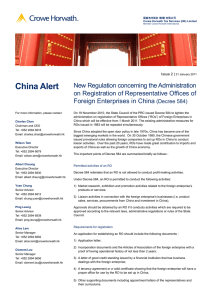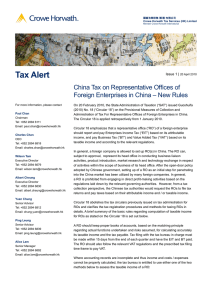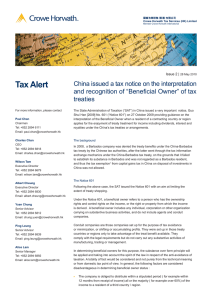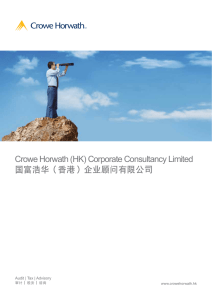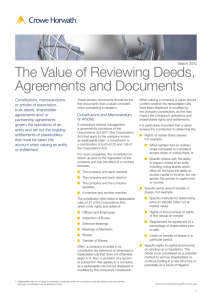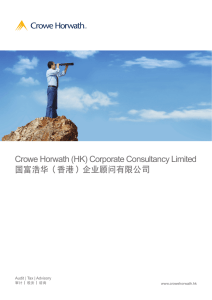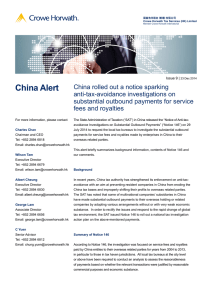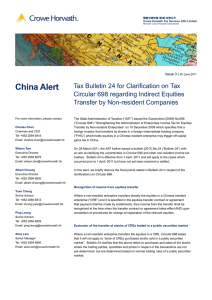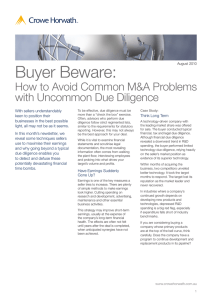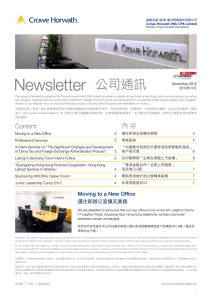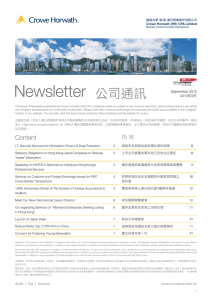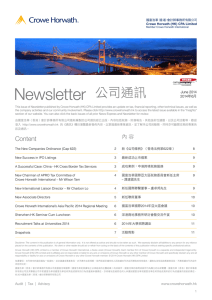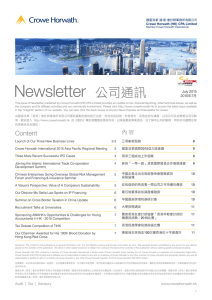Tax Alert China tax authorities taxed a foreign investor
advertisement
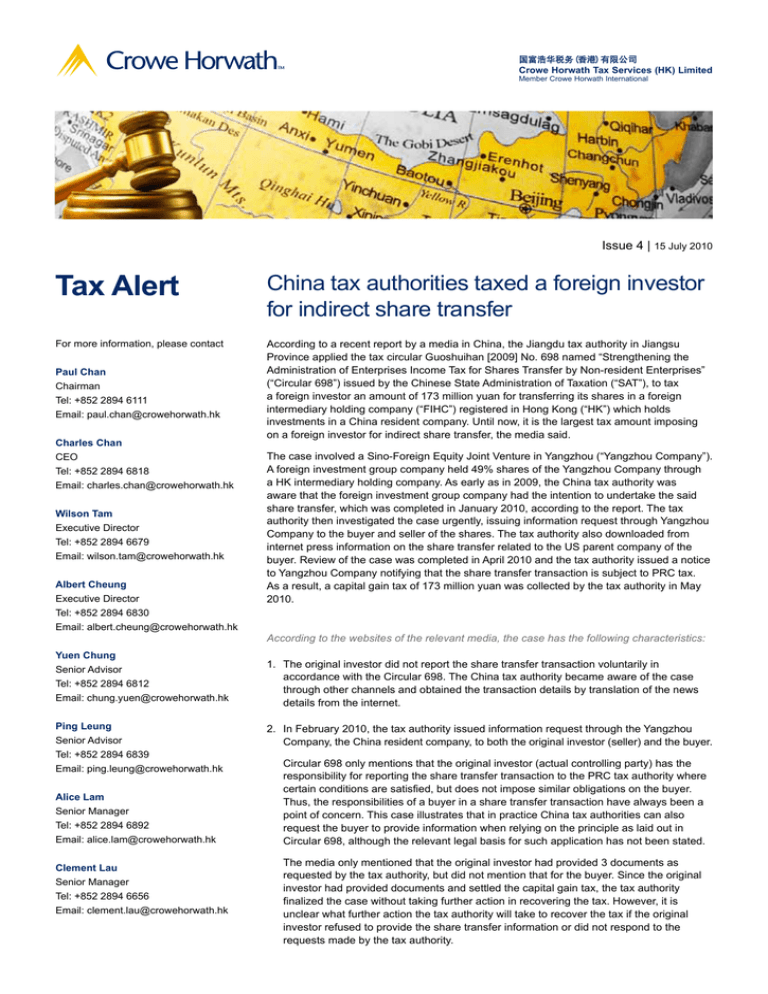
國富浩華稅務(香港)有限公司 Crowe Horwath Tax Services (HK) Limited Member Crowe Horwath International Issue 4 | 15 July 2010 Tax Alert China tax authorities taxed a foreign investor for indirect share transfer For more information, please contact According to a recent report by a media in China, the Jiangdu tax authority in Jiangsu Province applied the tax circular Guoshuihan [2009] No. 698 named “Strengthening the Administration of Enterprises Income Tax for Shares Transfer by Non-resident Enterprises” (“Circular 698”) issued by the Chinese State Administration of Taxation (“SAT”), to tax a foreign investor an amount of 173 million yuan for transferring its shares in a foreign intermediary holding company (“FIHC”) registered in Hong Kong (“HK”) which holds investments in a China resident company. Until now, it is the largest tax amount imposing on a foreign investor for indirect share transfer, the media said. Paul Chan Chairman Tel: +852 2894 6111 Email: paul.chan@crowehorwath.hk Charles Chan CEO Tel: +852 2894 6818 Email: charles.chan@crowehorwath.hk Wilson Tam Executive Director Tel: +852 2894 6679 Email: wilson.tam@crowehorwath.hk Albert Cheung Executive Director Tel: +852 2894 6830 Email: albert.cheung@crowehorwath.hk Yuen Chung Senior Advisor Tel: +852 2894 6812 Email: chung.yuen@crowehorwath.hk Ping Leung Senior Advisor Tel: +852 2894 6839 Email: ping.leung@crowehorwath.hk Alice Lam Senior Manager Tel: +852 2894 6892 Email: alice.lam@crowehorwath.hk Clement Lau Senior Manager Tel: +852 2894 6656 Email: clement.lau@crowehorwath.hk The case involved a Sino-Foreign Equity Joint Venture in Yangzhou (“Yangzhou Company”). A foreign investment group company held 49% shares of the Yangzhou Company through a HK intermediary holding company. As early as in 2009, the China tax authority was aware that the foreign investment group company had the intention to undertake the said share transfer, which was completed in January 2010, according to the report. The tax authority then investigated the case urgently, issuing information request through Yangzhou Company to the buyer and seller of the shares. The tax authority also downloaded from internet press information on the share transfer related to the US parent company of the buyer. Review of the case was completed in April 2010 and the tax authority issued a notice to Yangzhou Company notifying that the share transfer transaction is subject to PRC tax. As a result, a capital gain tax of 173 million yuan was collected by the tax authority in May 2010. According to the websites of the relevant media, the case has the following characteristics: 1. The original investor did not report the share transfer transaction voluntarily in accordance with the Circular 698. The China tax authority became aware of the case through other channels and obtained the transaction details by translation of the news details from the internet. 2. In February 2010, the tax authority issued information request through the Yangzhou Company, the China resident company, to both the original investor (seller) and the buyer. Circular 698 only mentions that the original investor (actual controlling party) has the responsibility for reporting the share transfer transaction to the PRC tax authority where certain conditions are satisfied, but does not impose similar obligations on the buyer. Thus, the responsibilities of a buyer in a share transfer transaction have always been a point of concern. This case illustrates that in practice China tax authorities can also request the buyer to provide information when relying on the principle as laid out in Circular 698, although the relevant legal basis for such application has not been stated. The media only mentioned that the original investor had provided 3 documents as requested by the tax authority, but did not mention that for the buyer. Since the original investor had provided documents and settled the capital gain tax, the tax authority finalized the case without taking further action in recovering the tax. However, it is unclear what further action the tax authority will take to recover the tax if the original investor refused to provide the share transfer information or did not respond to the requests made by the tax authority. Tax Alert Page 2 3. When determining whether to levy capital gain tax for an indirect share transfer, the Chinese tax authority mainly considered the existence or non-existence of “economic substance” in the FIHC located in Hong Kong. Where it is considered that the transaction is undertaken without “economic substance”, the tax authority could apply the general Anti-avoidance Rules to disregard the existence of the FIHC located in Hong Kong. 4. In the present case, the Chinese tax authority considered that the FIHC located in Hong Kong did not have economic substance on the basis that the press release in respect of the share acquisition by the buyer did not mention the share transfer of the FIHC located in Hong Kong. The case illustrates that the Chinese tax authority will not just rely on information provided by a taxpayer under investigation, but will look at indirect evidence such as information from internet. This is in line with the tax authority’s approach in initiating other tax investigations such as transfer pricing. 5. The case illustrates that a resident enterprise in China unavoidably has obligation to assist in the tax reporting to the PRC tax authority. This is evidenced from the fact that the tax authority issued a document to the Yangzhou Company notifying that the share transfer transaction is subject to tax in China and the tax return was filled by Yangzhou Company. Where it is subsequently found that there is error in submission of information for tax reporting, the PRC tax authority can hold the responsibility of the Yangzhou Company as a resident enterprise in China. Based on the analysis of the present case, we have the following suggestions: 1. Foreign group companies should review their investment holding structures for their China investment to assess the potential risk arising from Circular 698. In the present case, the Chinese tax authority determined that the FIHC located in Hong Kong did not have economic substance and thus applied the general Anti-avoidance Rules to disregard the existence of the FIHC. However, the primary objective for establishing a FIHC is usually based on legal and economic consideration, while tax consideration is merely secondary. Thus, it is of paramount importance that the investor can prove to the satisfaction of the PRC tax authority the legal and commercial substance of its investment holding structure in order to prevent the tax authority in applying the general Anti-avoidance Rules. Investors should obtain professional advices from their tax consultants for a thorough understanding on the implications of Circular 698. On the other hand, reasonable commercial purpose and economic substance should be established for the investment holding structure and sufficient documentary evidence should be maintained to substantiate the same. 2. Since announcements on share transfer transactions represent legal documents, the Chinese tax authorities will regard these as legal evidences. Thus, due care and prudence should be exercised in the disclosure of share transfer transactions. The buyer and seller should not undertake the share transfer transaction hastily on the assumption that the PRC tax authority cannot obtain the related information easily. Announcements on share transfer should be prepared based on the facts. The investor who is setting up a FIHC should adequately and reasonably set out the commercial purpose and economic substance of the investment holding structure based on the facts in order to withstand any potential challenge from the PRC tax authority. 3. The company which may become buyer in a share transfer transaction should obtain professional advices from a tax consultant in order to fully understand its reporting obligations under the tax law, and to devise reasonable and sufficient measures to protect its own interests for risk management purposes. Address 34/F The Lee Gardens, 33 Hysan Avenue, Causeway Bay Hong Kong General: +852 2894 6888 Facsimile : +852 2895 3752 E-mail : info@crowehorwath.hk Website: www.crowehorwath.hk Disclaimer: The information (“Information”) contained in this article have been prepared in general terms only and should not be construed as any advice, opinion or recommendation. The application of the Information to specific situations will depend on the particular situations involved. Professional advice should be sought before the application of the Information to any particular circumstances. Crowe Horwath International is a leading international organization of separate and independent accounting and consulting firms that may be licensed to use “Crowe Horwath” or “Horwath” in connection with the provision of accounting, auditing, tax, consulting or other professional services to their clients. Crowe Horwath International itself is a non-practicing entity, and does not provide professional services in its own right. Neither Crowe Horwath International nor any member is liable or responsible for the professional services performed by any other member.
